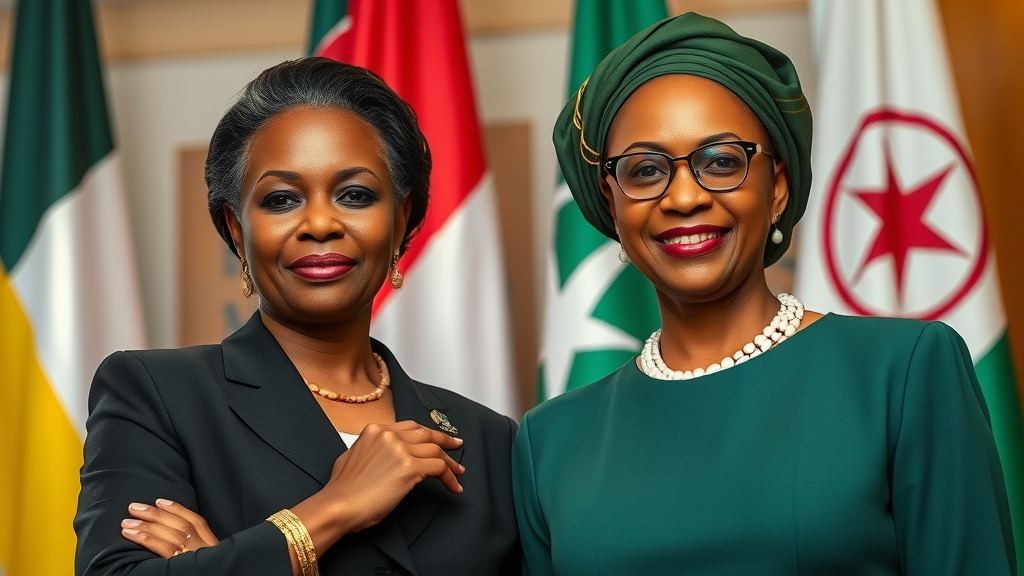Did you know that, in Africa, only 24% of parliamentary seats are held by women, despite comprising roughly half the population? This stark reality underscores “the time factor for women leadership in Africa”—a convergence of social, cultural, and institutional dynamics that have long delayed but not deterred the rise of women leaders. Today, bold African women are stepping into leadership roles, shattering glass ceilings, and inspiring momentum for unprecedented change. Let’s dive into the changing landscape—how timing, opportunity, and sheer tenacity are shaping a new era for women leadership in Africa.

Unveiling the Time Factor: How Women in Leadership Roles in Africa Are Shaping the Future
When discussing the time factor for women leadership in Africa , the conversation goes far beyond numbers or quotas. It’s about the growing momentum that is driving women to claim their rightful place at decision-making tables and boardrooms across the continent. As we witness more women leaders emerging in various leadership positions, we see that timing—historic and current—plays an essential role in redefining the narrative.
Women in leadership roles across Africa are influencing change in critical areas: politics, corporate governance, community development, and public policy. Take for example women like Ellen Johnson Sirleaf, Africa’s first female president, or Ngozi Okonjo-Iweala, now head of the World Trade Organization; their rise didn’t happen overnight. Decades of advocacy, persistence against societal resistance, and aligning the “time factor” with personal ambition made their journeys possible. Their stories set a precedent, illustrating that while barriers remain, the opportunities for meaningful leadership roles for women in Africa are multiplying—one determined leader at a time.
"In Africa, only 24% of parliamentary seats are held by women, yet every step forward challenges old paradigms and inspires new generations."
Critical Shifts in Leadership Positions: Women Leaders and the Changing Face of Leadership in Africa
- Current trends in women leadership: Increasing female representation in politics and corporate management positions.
- The growing presence of African women leaders: More African women are now CEOs, ministers, and influential executives than ever before.
- Impact on leadership positions and roles across sectors: Women leaders bring fresh perspectives, prioritize inclusive policies, and foster gender equal workplaces, setting new standards for leadership in Africa.
The transformative power of women in leadership roles is echoed across African countries. The growing presence of African women leaders changes the face of public and private institutions alike. In countries like Rwanda, which leads global rankings for women in parliament, initiatives promoting gender equality serve as powerful examples for others to emulate. These leaders are developing a pipeline of future female leaders, nurturing talent through networks and mentorship programs. By championing diversity in leadership roles and actively recruiting women for positions of power, organizations and governments leverage the talents and perspectives of all citizens—not just half.
Moreover, the ripple effect is evident: where there are more women leaders, there is often greater investment in education, health care, and programs supporting marginalized groups. Such shifts not only break through entrenched stereotypes but also demonstrate that sustainable progress relies on gender equal leadership. African women in leadership positions are actively driving progress toward greater gender diversity and parity.

The Historical Time Factor for Women Leadership in Africa: Progression and Persistent Challenges
From Tradition to Transformation: The Evolution of Women in Leadership Roles
Understanding the historical context of women in leadership in Africa requires examining the transition from traditional roles to transformative leadership positions. Traditionally, African societies were patriarchal, with leadership roles often reserved for men leaders. However, women played crucial roles in communities—as queen mothers, councilors, or spiritual guides—laying foundational leadership skills often overlooked in formal accounts. The time factor here is about how long it has taken to shift from invisible to visible leadership for women.
The post-independence era ushered in significant change. The rise of nationalist movements and increased advocacy for human rights opened new doors to women leaders in public and political arenas, albeit slowly. Despite initial resistance, contemporary African women are harnessing education, networking, and digital media to propel into leadership positions not just in politics, but in business, science, and nonprofits. Each step represents a victory against deep-rooted gender biases—a transformation driven both by slow-moving societal progress and lightning-fast shifts spurred by globalization.

Facing the Past: Challenges Faced by Women in Leadership Positions
Despite progress, the challenges faced by women in leadership remain formidable. Historical exclusions and gender stereotypes persist, limiting the number of women who can rise to leadership roles. Leadership in Africa is still highly influenced by cultural expectations around gender, where women are often expected to prioritize family over career. This cultural inertia results in fewer women leaders, perpetuating the myth that leadership roles are for men.
Women also face institutional barriers: discriminatory policies, lack of supportive networks, and insufficient access to finance or skills training. These factors have a compounding effect, leaving the proportion of women in management positions and political leadership roles significantly lower than their male counterparts. The “time factor” refers not just to delayed progress, but also to the double and triple shifts many women endure—juggling professional, domestic, and community responsibilities, often with little support.
However, across decades, trailblazing African women leaders have challenged these norms by consistently proving that women’s leadership is just as impactful, if not more so. Facing adversity has sharpened their focus, transforming individual efforts into broad-based movements for change in leadership positions.
| Era | Country | Impact |
|---|---|---|
| Pre-Colonial | Nigeria (Yoruba, Benin) | Queen Mothers and spiritual leaders provided counsel and oversight |
| Post-Independence 1960s-80s | Ghana, South Africa | First female ministers and activists emerged during liberation struggles |
| 1990s | Rwanda, Uganda | Quota systems introduce more women into parliament and cabinet positions |
| 2000s–Present | Liberia, Nigeria, Kenya | Women ascend to presidency, prime minister, top corporate, and international roles |

Comparing Men Leaders and Women Leaders in Africa: Opportunities and Obstacles
Leadership Role Dynamics: What Distinguishes Women in Leadership from Their Male Counterparts?
- Differences in leadership positions occupied: Women are still underrepresented in the highest leadership roles, though they excel in social, community, and youth-focused initiatives. In contrast, men leaders are often found at the helm of political, security, and economic sectors.
- Unique approaches to challenges faced in leadership: Women leaders in Africa tend to emphasize consensus-building, social investment, and long-term wellbeing, while their male counterparts may focus more on economic or militaristic achievements. Women are often more collaborative and innovative in overcoming barriers with fewer resources.
The leadership role dynamics between men leaders and women leaders are complex. While the number of women in leadership has increased, men still overwhelmingly hold the majority of positions of power, especially in politics and boardrooms. Yet, research consistently shows that organizations led by women are more likely to adopt inclusive policies, engage communities, and drive sustainable growth. This distinctive approach to leadership increases both representation of women and overall efficacy in addressing Africa’s most pressing challenges.
The continued disparity underscores why the time factor for women leadership in Africa remains crucial: every year of under-representation is a missed opportunity for societal progress and innovation across leadership roles.

Statistics Highlight: The Current Percentage of Women in Leadership in Africa
According to recent UN reports, about 24% of seats in African parliaments are held by women, varying widely by country and sector. For instance, Rwanda boasts over 60% women in parliament , the highest in the world, while other countries still struggle with single-digit female representation. In corporate leadership positions, women fill about 29% of managerial roles across African countries—a number steadily increasing but still subject to regional disparities.
These statistics point to two realities: progress is real, and the journey is far from finished. Women leaders are making strides, but there is still a significant gap to be closed—particularly in positions at the apex of decision-making.
Efforts to promote gender equal leadership roles are ongoing, but overcoming deeply entrenched norms and historical biases remains a time-bound challenge in leadership in Africa.
African Women Leaders: Pioneers Who Are Defining Female Political and Business Leadership Roles

Notable Stories: How African Women Leaders Are Overcoming Barriers
- Case studies of female political leadership: Ellen Johnson Sirleaf’s tenure as Liberia’s president transformed perceptions of female leadership in Africa, fostering peace and reconciliation after civil war. Ngozi Okonjo-Iweala’s rise in global finance positioned African women as thought leaders on the world stage.
- Insights from women leaders across corporate, public, and nonprofit sectors: Women like Strive Masiyiwa (nonprofit), Ibukun Awosika (business), and Phumzile Mlambo-Ngcuka (public policy) have not only shattered glass ceilings, but also championed values of inclusion and mentorship, inspiring a new generation of African women leaders.
These female leaders show that the challenges faced by women can be overcome through strategic alliances, visionary leadership role models, and taking full advantage of changing times. Their personal stories illustrate the importance of timing, advocacy, and resilience in enhancing the profile and impact of women leaders in Africa.
By lifting one another, African women in politics, business, and civil society multiply their impact, creating vibrant networks that foster the rise of future women leaders across the continent.
South Africa, Nigeria, and Beyond: Regional Differences in Women Leadership Positions
South Africa’s Approach to Promoting Women in Leadership Roles
South Africa stands as a beacon for women in leadership on the continent, having implemented rigorous gender equality laws, company quotas, and public sector reforms. These measures have propelled significant numbers of women into parliament, cabinet, and senior management positions, far surpassing many peer African nations. Corporate South Africa, in particular, is seeing a steady increase in the number of women executives and board directors, reflecting growing attention to gender diversity and inclusion.
Yet, gaps persist. While laudable progress has been made in government and large corporations, women often remain underrepresented in smaller businesses or community-based organizations where patriarchal attitudes linger. The South African example shows that transformative change is possible through policy—and sustained only when cultural change and mentorship back up legislative action.

Comparing Opportunities and Gaps for African Women Leaders Across Regions
While countries like Rwanda and South Africa shine, others lag—highlighting significant regional disparities in female representation. Nigeria , Africa’s largest economy, still records some of the lowest rates for women in parliament and senior management. This reflects differences in political will, societal norms, economic structures, and education access. East and Southern African regions, often driven by activism and reformist policies, generally see greater representation of women in public office, while West and North Africa struggle with more traditional gender roles.
This comparative approach reveals both the promise and persistent hurdles faced by women in leadership positions across African countries: progress is possible with the right environment, but geography, history, and culture deeply influence how quickly women can rise.
| Country | Women in Parliament (%) | Women in Management (%) |
|---|---|---|
| Rwanda | 61 | 41 |
| South Africa | 46 | 36 |
| Nigeria | 6 | 23 |
| Kenya | 21 | 30 |
Challenges Faced by Women in Leadership in Africa: Why the Time Factor Remains Critical

- Societal and cultural barriers: Widely held beliefs about gender roles continue to restrict women’s mobility and influence in African countries, particularly in rural and conservative areas.
- Institutional and policy-related challenges: Lack of policies supporting maternity, flexible work, or affirmative action means that leadership opportunities are not always equally accessible to women.
- Work-life balance and time management as a leadership role hurdle: African women leaders face “the time factor” daily—juggling household duties, caregiving, and high-stakes careers, often without adequate support systems.
The challenges faced by women in leadership positions are deeply intertwined with the time factor. Competing expectations—professional success, family obligations, and community roles—put immense pressure on aspiring female leaders. African women must innovate constantly, finding ways to maximize limited time and energy while breaking through the “invisible” barriers that their male counterparts may not encounter as frequently.
These realities contribute to the persistent underrepresentation of women in leadership roles and demand collective action if sustained progress is to be achieved for women in leadership across Africa.
"Time is not just a resource, but often the greatest barrier between women and leadership positions in Africa."
The Role of Men Leaders and Male Allies in Advancing Women Leadership in Africa
Success Stories of Male Advocates for Women in Leadership Roles
- Collaborative leadership initiatives: In countries such as South Africa and Botswana, male leaders have launched gender diversity initiatives, actively sponsoring women for management positions and championing equal pay policies.
- Mentorship and sponsorship cases: Influential men in politics, business, and civil society are leveraging their positions of power to mentor and open doors for future women leaders, providing sponsorship for female colleagues and encouraging a more gender equal workplace.
Male allies play a pivotal role in transforming the leadership landscape. Where men leaders and male advocates take on mentorship and challenge discriminatory practices, the rate of women ascending to leadership roles increases significantly. These collaborations don’t just empower individual women—they catalyze institutional change, shifting organizational cultures toward greater inclusion.
By supporting policy reforms, amplifying the voices of women in leadership, and actively dismantling gender-based barriers, male leaders contribute powerfully to advancing the time factor for women leadership in Africa. Joint efforts accelerate progress and foster a truly representative leadership in Africa.

Empowering Women in Leadership in Africa: Strategies to Accelerate Progress
Policy, Education, and Mentorship: The Pillars Elevating Women to Leadership Positions
- Government and corporate policies impacting women in leadership: Introducing gender quotas, parental leave, and flexible work arrangements has proven effective in closing the gender gap in leadership roles.
- The value of mentorship for African women in leadership roles: Structured mentorship and sponsorship programs enable aspiring women leaders to access invaluable advice, grow their networks, and build confidence to pursue top leadership positions.
For the time factor to work in women’s favor, a concerted focus on policy, education, and mentorship is required. Legislative reforms in countries like South Africa and Rwanda show that tangible change is possible. Still, it is individual connections—mentors, sponsors, and role models—that inspire women to break boundaries and claim new leadership roles.
Organizations that champion inclusive leadership styles and value gender diversity attract and retain the best talent. These environments foster a culture of continuous learning, skill development, and empowerment for women in leadership, ensuring the pipeline of female leaders continues to flourish.

Innovative Approaches to Overcoming the Time Factor for Women Leadership in Africa
The new era of african women leaders is defined by innovation—both in overcoming traditional barriers and in adapting to modern challenges. Flexible schedules, remote work, digital platforms, and agile project management offer advantages for women balancing family care and leadership demands. Technology also allows for learning and networking unimpeded by geographic barriers, connecting women leaders across African countries and industries.
Forward-thinking organizations pilot support groups, coaching circles, and professional development seminars tailored to women’s needs. Such programs focus on time management, building support systems at home and work, and nurturing resilience—crucial qualities for women striving to rise into top leadership roles. By prioritizing innovation and support, Africa accelerates towards a gender equal future for leadership roles.

What Are the Main Factors that Influence Women's Rise to Leadership Positions?
Answer: Key drivers include supportive policies, access to education, societal attitudes, mentorship, and strong role models. The time factor plays a crucial part, especially in balancing multiple responsibilities.
What Are the Barriers to Female Leadership in Africa?
Answer: Barriers range from cultural expectations, lack of supportive networks, limited mentorship, policy gaps, and enduring time constraints compared to men leaders.
What Is the Percentage of Women in Leadership in Africa?
Answer: On average, about 24% of parliamentary seats in Africa are occupied by women, with variations across regions and sectors.
What Are the Stats About Women in Leadership?
Answer: Approximately 29% of managerial roles and 24% of parliamentary seats in Africa are filled by women, but representation is higher in some countries such as Rwanda.
Frequently Asked Questions About the Time Factor for Women Leadership in Africa
- How can African women overcome the time barrier in pursuing leadership roles? Through strategic time management, leveraging support systems, and pursuing flexible work and education solutions, African women are finding creative ways to overcome the time barrier. Building community, sharing domestic responsibilities, and prioritizing self-care are also critical elements for success in leadership positions.
- Are there specific sectors where women leadership is growing faster in Africa? Yes, sectors like finance, health, nonprofit, and local government are experiencing faster growth of women in leadership roles. Advocacy, policy changes, and targeted recruitment are helping close gender gaps in these areas, fostering more opportunities for aspiring female leaders.
- What impact does a supportive leadership role model have for aspiring women leaders? A supportive leadership role model offers guidance, motivation, and proof that success is possible. Mentorship from established women leaders boosts confidence and provides actionable strategies for navigating challenges faced by women in leadership, significantly improving the prospects of the next generation.
Key Insights from the Time Factor for Women Leadership in Africa
- Progress for women in leadership positions is accelerating, but the time factor remains a central challenge.
- African women leaders are setting new standards and influencing change across the continent.
- Policies, cultural change, and supportive men leaders are crucial to ongoing progress.
Take Your Place in Shaping Leadership in Africa: Encouragement for African Women and All Allies
"Every moment matters: Now is the time to rise, mentor, and lead for the next generation of African women leaders."
Action Step: Whether you are an aspiring woman leader, a male ally, or a policymaker, commit to building networks, championing inclusive leadership, and supporting the next wave of African women in leadership roles. Your actions help shape a legacy of powerful, transformative, and time-defying leadership in Africa.
 Add Row
Add Row  Add
Add 




Write A Comment